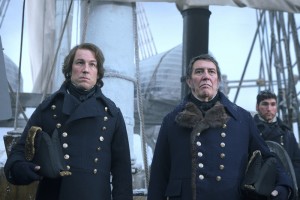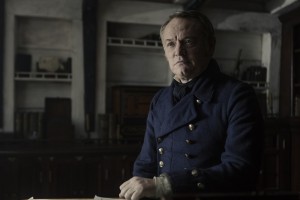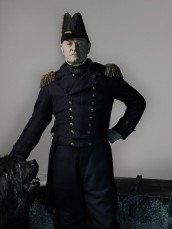
Ciarán Hinds as John Franklin and Tobias Menzies as James Fitzjames in THE TERROR | © 2018 AMC
AMC’s new Monday night ten-part series THE TERROR is based on a novel by Dan Simmons, which is in turn based on real events. In 1848, two British Navy vessels, The Terror and The Erebus, voyaged towards the Arctic in search of the then-undiscovered Northwest Passage. The ships became trapped in the ice. Both were finally located in recent years (after the book was published, but before the series was made), but the fate of their crews is unknown. Simmons’ novel and the series, adapted by David Kajganich, imagine what might have happened to the men, combining historical observation with ominous mythology.
Actors Jared Harris (recently King George VI in Netflix’s THE CROWN and an Emmy nominee for his work in MAD MEN), who plays Francis Crozier, and Tobias Menzies (Black Jack Randall and Frank Randall in OUTLANDER) sit down together to discuss their work in THE TERROR.
ASSIGNMENT X: Your characters seem very much at odds, at least initially. What’s the primary source of tension?
TOBIAS MENZIES: I would say class. He’s Irish. These things mattered in that time, and without any embarrassment. I mean, Jared will say more about that, but his character is definitely defined by his Irishness and that has held him back, whereas my career has been the opposite of that. I’ve been a sort of star of the navy. So we’re definitely coming from opposite ends of the spectrum, and then both of us, through being forced together through circumstances, through the incredible pressures that they experience for these two winters in this place kind of strips us all down, and we find out a bit more of what’s underneath. One of the things I love about the show is the journey between these two characters, that they get to a place of greater humanity. I think [Fitzjames] is forced into humility. There’s a sort of hubris and arrogance in the man when he starts off on that journey.
JARED HARRIS: From my character’s point of view, he sees Fitzjames as really not having earned his position that he’s got, and that all of the entries that [Fitzjames] has into society are denied to [Crozier], because he’s Irish. He has the experience, but because he’s Irish, he’s looked down upon and seen as a second-class citizen. Although he has the expertise, he’s not been given these opportunities. Crozier has made, at this point, three trips to the Antarctic, and in his opinion, although he’s putatively second in command, he wasn’t put in second in command. Fitzjames is given the position of crewing out all the ships, and really was given that, although [addressing Menzies] you are below my character in terms of chain of command, because of his relationship with Franklin [the captain played by Ciaran Hinds], he’s been put in charge of things that I should have been put in charge of. So he’s sort of sulking, really. Crozier is sulking, and he’s got a bad attitude and a chip on his shoulder. There are actually misconceptions about one another that are completely wrong, their prejudiced assumptions about one another. I mean, from [addressing Menzies] your point of view toward my character’s, you can see, he is a boozer. [laughs] He’s not really making an assumption about that.
MENZIES: [laughs] That’s real.
HARRIS: But they make assumptions about the qualities that they have as people, and they’re actually wrong, and that’s one of the things that gets revealed, and almost surprises each character, is what they discover about themselves in terms of what their nature is like. But yeah, it’s a prejudice, essentially, is what’s in the way of these two characters.
AX: You have both obviously done a lot of location shooting before, but is this the coldest location shoot you’ve ever done? It certainly looks extremely chilly.
MENZIES: It’s got to be up there, yeah. We were shooting most of it in Budapest over the winter, and it gets pretty frosty.
HARRIS: It was cold. They saved money on the old breath thing [no camera tricks were needed to make breath appear on camera]. It was really, really freezing in the beginning. And then when we were in Croatia, we had a different sort of animus to deal with as well, because where we were, it’s famous for its very high winds that can go up to about two hundred miles an hour. They have to close the bridges down, you can’t travel there, so there were some days when we just watched our sets blowing away, because the wind would kick up.
MENZIES: So we had a bit of weather to deal with, for sure.
AX: How were the sets for the full ships?
HARRIS: Large, full-sized, and they built one ship, and each deck was in a different soundstage.
MENZIES: It was all built, all as one, so it was continuous, but you could take walls out of the side and shoot, you could get cameras inside.
HARRIS: And there was one set that was the upper deck, with the masts and the sides of the ship. They had another set that was where the crew and then the officers’ quarters, the corridor, and the great room, and the captain’s cabin. So that was all one set.
MENZIES: And there was obviously the stuff at the bottom of the ship.
AX: To clarify, you had one ship built, and you dressed it for both, depending on what was needed that day?
HARRIS: Yeah, The Erebus or The Terror –
MENZIES: And we accessorized it.
HARRIS: At one point, the ships get trapped and the ice keeps building up, and one of the ships starts to tilt. It took about three days to tilt the ship, so whilst we were doing that, you’d shoot something else and redress something else, and you’d come to that one.
AX: What drew you to this project?
MENZIES: For me, definitely the pilot script that I was sent to do, the beautiful writing, very restrained and the confidence of the storytelling, didn’t feel the need to explain too much, rich on the detail. And also, as soon as I started to dig around in terms of the naval history that it was telling, that’s also an incredible story, so those two things combined, I thought this could be extraordinary.
AX: Was the metaphysical aspect on top of the empire-building aspect one of the attractions for you, that this is not as straightforward an adventure/disaster as some other stories of the period?
HARRIS: Yeah. It makes it a genre story, as opposed to being a straightforward historical story. And that’s of course what Dan Simmons’s book was. It’s an adaptation of Dan Simmons’s book. And what was interesting about that was, there’s nothing of that in the first episode, but you knew that that was there. They really cleverly sort of hinted toward this eerie quality, and some unsettling qualities, and they ventured into a place that they didn’t understand, and they cleverly evoke that in that first episode. That’s all I got to read when I signed off [on joining THE TERROR cast], but I think it’s a representative of the unknown.
MENZIES: This show, I think it’s a mistake to characterize it as straightforwardly a monster show. It’s much more psychological, it’s much more thematic, I think.
AX: Once they are trapped, something begins stalking them. Do we know what that is?
HARRIS: But a mythological creature. What is the Terror? Is there a monster? The idea of the show is, there are several monsters in the story, and that particular one is connected with the Inuit story, and it’s the idea that we’ve gone blundering into this world with our imperialistic arrogance, and that we know how to do this, we know these people are second-class citizens to us and we’ve gone stumbling into this world that we shouldn’t be in, and we awaken, if you like – not really awaken, but we cause to go into a motion a force that we don’t really understand.
MENZIES: In a way, the series never really pins that down, but it’s a major arc of the piece, because David is certainly looking through the piece to articulate the idea about the cost of empire, the cost of colonization of other cultures.
HARRIS: Yeah.

Jared Harris as Francis Crozier in THE TERROR | © 2018 Aidan Monaghan/AMC
MENZIES: And we’re at the high point of that, high Victorian, the arrogance, the hubris of all that, and that’s absolutely at the heart of all that’s swirling around thematically in the piece.
AX: What kind of research did you do into any aspects of life in the British Navy of that era?
HARRIS: We had a guy there, Jim [Dines], who was a British Navy [expert], and a very good sailor, and we relied on him very much in terms of what would be expected of us in terms of the salutes and the deference that one has to pay. And that stuff’s really important to get right. But the research part of it is part of the fun of these things, is that you get to delve into a life that you obviously have no sort of experience of in any way.
MENZIES: Obviously, most of the drama happens in these two ships stuck in the ice, so the society that those ships represented are highly codified, deeply hierarchical, and so breathing life into those and giving those texture and character was a very important part of bringing that what could be quite an impenetrable world, bringing that to life, and those different characters that populated these very intimate communities.
HARRIS: The story leaves the ships.
AX: Where actually were the ships stranded? Were they in the middle of nowhere, so far as they knew?
HARRIS: Well, they do know where they were. They knew where The Erebus was, but last summer, they found The Terror. It was sunk in about thirty-five feet of water. At the time, they [the sailors] knew where they were, because they left messages for anyone who was coming to find them, about where their last positions were. When they decide to abandon ship, they go and they leave this message [regarding] where they are and what’s happened. So they know exactly where that was. And where that was, if you’re going through – it’s above the area of the Great Lakes. So if you’re going through the Victoria Strait, around King William. They thought it was a peninsula – King William is actually an island. They went above that, because there was that moment in the first episode where they talk about, “Let’s go and hide. It might be open and it might not be, but we will be protected from there.” And they actually decide to go across it, and they get stuck in the middle. There’s this channel where all of the Arctic ice as it’s forming and created gets crushed down in a super-highway of glaciers that comes straight down towards them. They couldn’t have stopped in a worse place, basically.
AX: Was it ever discussed why one ship was christened The Terror? That wouldn’t seem the luckiest of names …
MENZIES: Well, they were all warships. They were warships that were refitted for discovery.
HARRIS: They were bombardment ships.
MENZIES: It’s a pretty good warship name. It’s not such a great “This is your home.”
HARRIS: But actually, they were very famous ships. You wouldn’t change it, because that would be seen as [dishonoring their achievements].
MENZIES: They had these c.v.s [resumes].
HARRIS: Very much so. Both ships had discovered large parts of the Antarctic. The two volcanoes that exist in the Antarctic are named the Terror and the Erebus after the two ships. So they’d actually had a long history of successful service. They were part of – which might not make you [American journalists] so happy – but in your national anthem, about the rockets’ red glare, that is The Terror raining down fire on Washington. So they’d had a long naval history.
MENZIES: They were big stars in their own right, the two ships.
HARRIS: Because they were bombardment ships, they had super-thick hulls, which they thought, well, these will be able to survive the crushing impact of the ice. They expected to get trapped in the ice, and they were outfitted to survive between three to five years, and at a push, they could do seven. And people got stuck in the ice for over three years. That did happen.
AX: Mr. Menzies, you were previously in ROME with Ciaran Hinds, who plays Captain Franklin in THE TERROR. You were also both in GAME OF THRONES, though I don’t believe you had any scenes together in that one. What was it like working with him again?
MENZIES: We played Caesar and Brutus [in ROME], that’s right. And funnily enough, there’s a sort of echo in this, a slightly father/son relationship in this. [He and Harris begin joking.] I mean, Ciaran’s one of the worst people in the world –
HARRIS: Very grumpy –
MENZIES: Not charismatic at all, not charming, really tough company –
HARRIS: Can’t hold his booze –
MENZIES: No stories. So yeah, it was pretty tough. He’s a delight. I was super-young when I did ROME, so I didn’t know what I was doing then. I don’t really know what I’m doing now [laughs], but yeah. Ciaran is one of our finest actors, so it’s always great to get in front of a camera with someone like that, and he brings so much to the party.
AX: Are your characters literally real people, or are they based on real people?
MENZIES: They’re real people.
HARRIS: There’s a statue to Crozier in the North of Ireland.
AX: Did your research help you in playing your characters?
MENZIES: Hugely.
HARRIS: I found letters that [Crozier] had written to James Ross, right prior to the last stop they made in Greenland, before they go off into the Arctic Circle. It was incredibly powerful, because first of all, he’s talking about all these characters that are on the ship, and he’s talking about his dissatisfaction with the circumstances that he’s in, and then he also alludes to this disappointment that he’s had in his romantic life. And he’s basically resigned himself to the fact that he will never experience love, and that this life that he has is the only thing that he can look forward to. And he says, “Oh, well, it’s the hurly-burly of the sea for me. I shall have to make do.” So you read the implication of that and you realize this is a real person who has written it. So yeah, it’s incredibly powerful.
MENZIES: And those two ships are full of a hundred and twenty-odd men, all going to this place for a variety of reasons. Some were escaping heartbreak, some are seeking glory and adventure, some are maybe even stowaways to escape God knows what. So it’s all part of a rich tapestry, this community that gets trapped.
This interview was conducted during AMC’s portion of the Winter 2018 Television Critics Association (TCA) press tour.
Follow us on Twitter at ASSIGNMENT X
Like us on Facebook at ASSIGNMENT X
Article Source:Assignment X
Article: THE TERROR: Jared Harris & Tobias Menzies on being lost at sea – interview
Related Posts:











